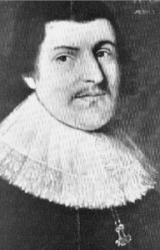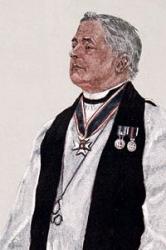Planning worship?
Check out our sister site, ZeteoSearch.org,
for 20+ additional resources related to your search.
- |
User Links
Person Results
Thomas Sanders Dupuis
1733 - 1796 Person Name: Thomas Sanders Dupuis, 1730-1796 Composer of "[We praise Thee, O God]" in The Book of Praise
Thomas Sanders Dupuis
Luke Flintoft
1680 - 1727 Person Name: L. Flintoft Adapter of "[We praise you, O God]" in Moravian Book of Worship English clergyman and composer
Luke Flintoft
William Croft

1678 - 1727 Person Name: W. Croft , 1678 - 1727 Composer of "[We praise thee, O God] (Croft)" in The Hymnary William Croft, Mus. Doc. was born in the year 1677 and received his musical education in the Chapel Royal, under Dr. Blow. In 1700 he was admitted a Gentleman Extraordinary of the Chapel Boyd; and in 1707, upon the decease of Jeremiah Clarke, he was appointed joint organist with his mentor, Dr. Blow. In 1709 he was elected organist of Westminster Abbey. This amiable man and excellent musician died in 1727, in the fiftieth year of his age. A very large number of Dr. Croft's compositions remain still in manuscript.
Cathedral chants of the XVI, XVII & XVIII centuries, ed. by Edward F. Rimbault, London: D. Almaine & Co., 1844
William Croft
Myles Birket Foster
1851 - 1922 Person Name: Myles B. Foster Composer of "[We praise thee O God]" in The Church Service Book Born: November 29, 1851, London, England.
Died: December 18, 1922, London, England.
Son of an artist, Foster attended Brighton and Guildford Grammar School and entered the stock exchange. He subsequently enrolled at the Royal Academy of Music and played the organ at St. James Church, Marylebone, and St. George’s, Campden Hill. From 1880-92 he was organist at the Foundling Hospital and at Her Majesty’s Theatre, and was choirmaster of St. James, Holborn. He composed children’s cantatas and much church music. His works include:
Methodist Free Church Hymns, 1889 (co-editor)
Anthems and Anthem Composers (London: Novello and Company, 1901)
History of the Philharmonic Society (London: 1913)
--www.hymntime.com/tch/
Myles Birket Foster
E. J. Hopkins

1818 - 1901 Person Name: Edward J. Hopkins, 1818-1901 Composer (26-29) of "[We praise Thee, O God]" in African Methodist Episcopal Church Hymnal Dr Edward John Hopkins MusDoc United Kingdom 1818-1901. Born at Westminster, England, the son of a clarinetist with the Royal Opera House orchestra, he became an organist (as did two of his brothers) and a composer. In 1826 he became a chorister of the Chapel Royal and sang at the coronation of King William IV in Westminster Abbey. He also sang in the choir of St. Paul’s Cathedral, a double schedule requiring skill and dexterity. On Sunday evenings he would play the outgoing voluntary at St. Martin’s in-the-field. He left Chapel Royal in 1834 and started studying organ construction at two organ factories. He took an appointment at Mitcham Church as organist at age 16, winning an audition against other organists. Four years later he became organist at the Church of St. Peter, Islington. In 1841 he became organist at St. Luke’s, Berwick St., Soho. Two Years later he was organist at Temple Church, which had a historic organ (built in 1683). He held this position for 55 years. In 1845 he married Sarah Lovett, and they had four sons and five daughters. He was closely associated with the Bach Society and was organist for the first English performances of Bach’s St. Matthew Passion. In 1855 he collaborated with Edward Rimbault publishing “The organ, its history and construction” (3 editions 1855-70-77). In 1864 he was one of the founders of the “College of organists”. In 1882 he received an honorary Doctorate of Music from the Archbishop of Canterbury. He composed 30+ hymn tunes and some psalm chants, used by the Church of England. He died in London, England.
John Perry
E. J. Hopkins
Henry Lawes

1596 - 1662 Person Name: H. Lawes Composer of "[We praise thee O God] (Lawes)" in The Church Hymnal Born: January 5, 1596, Dinton, Wiltshire, England.
Died: October 21, 1662, London, England.
Buried: In the cloisters of Westminster Abbey, London, England.
Lawes, tutor to the daughters of the Earl of Bridgewater, is best known as a composer. He became a Gentleman of the Chapel Royal in 1626, and a member of the "King’s Musick" in 1631. He wrote over 400 vocal pieces, as well as anthems and instrumental compositions. His works include:
Choice Psalmes Put into Musick for Three Voices, 1648
Ayres and Dialogues (London: 1653)
Sources:
Frost, p. 680
Hughes, pp. 467-68
Nutter, p. 460
Stulken, p. 292
--www.hymntime.com/tch
Henry Lawes
Frederick A. J. Hervey

1846 - 1910 Person Name: Hervey Composer of "[We praise Thee, O God]" in Voices of Praise Born: May 18, 1846, Westminster, Middlesex, England.
Died: August 8, 1910, Norwich, England.
Buried: St. Mary Magdalene’s Church, Sandringham, Norfolk, England.
Son of Alfred, Lord Hervey, Frederick was educated at Marlborough and Trinity College, Cambridge (BA 1868, MA 1872). He was ordained a deacon in 1869, and priest in 1870. He served as Rector of Upton-Pyne, Devon (1876); Sandringham (1878-1907); Canon of Norwich (1897); and Domestic Chaplain to King Edward VII (1901).
--www.hymntime.com/tch/
Frederick A. J. Hervey
F. A. Gore Ouseley

1825 - 1889 Person Name: Rev. Sir F. A. G. Ouseley Composer of "[We praise thee O God]" in The Hymnal, Revised and Enlarged, as adopted by the General Convention of the Protestant Episcopal Church in the United States of America in the year of our Lord 1892 Born: August 12, 1825, London, England.
Died: April 6, 1889, Hereford, England.
Buried: Church of St. Michael and All Angels, Tenbury Wells, Hereford and Worcester, England.
Gore-Ouseley was educated at Oxford University (BA 1846, MA 1849, DMus 1854), and was ordained in 1849. In 1855, he was appointed Oxford Professor of Music, succeeding Henry Bishop. At that time, Oxford music degrees were easy to obtain, as there were no conditions of residence. Candidates only had to submit a musical composition, (e.g., for choir or orchestra). This was then approved by the examiner, rehearsed and performed to a small, select audience at Oxford. As far as Ouseley was concerned, this only meant two or three trips to Oxford each year, usually for two or three days each time, as there was no music "taught" in the university and very little in Oxford itself at the time.
Also in 1855, Ouseley was appointed Precentor of Hereford Cathedral, a post he held for the next 30 years, before becoming a Canon there. Although theoretically in charge of the cathedral choir, Ouseley only had to be in residence at the cathedral two months each year, and he arranged these to take place during the summer vacation, when he was not required to be at his College, although such was his commitment that he did make regular visits to the cathedral, which was only 18 miles from his College at St. Michael’s.
His College of St. Michael’s, Tenbury, a "model" choir school, opened in 1856, mostly at his own expense. He founded the College and was its first Warden, which was the greater part of his work for the next 33 years.
Ouseley’s compositions covered a wide range: operas, songs, chamber music and organ pieces. His works include the following treatises:
Harmony (London: 1868)
Counterpoint (London: 1869)
Canon and Fugue (London: 1869)
Form and General Composition (London: 1875)
--www.hymntime.com/tch/
F. A. Gore Ouseley


 My Starred Hymns
My Starred Hymns

